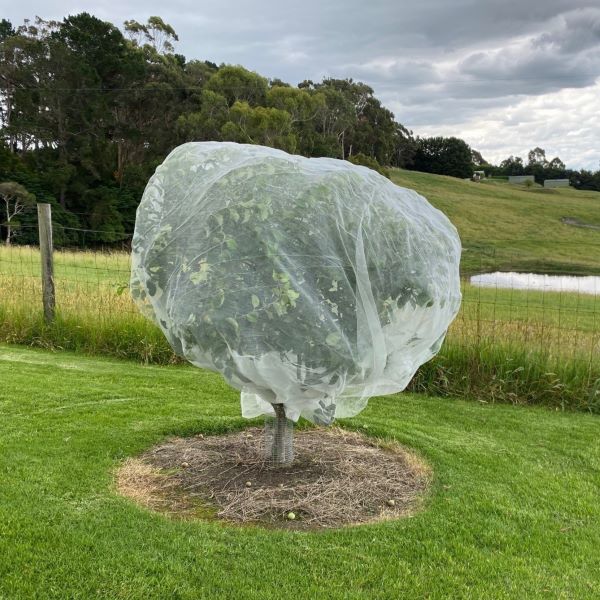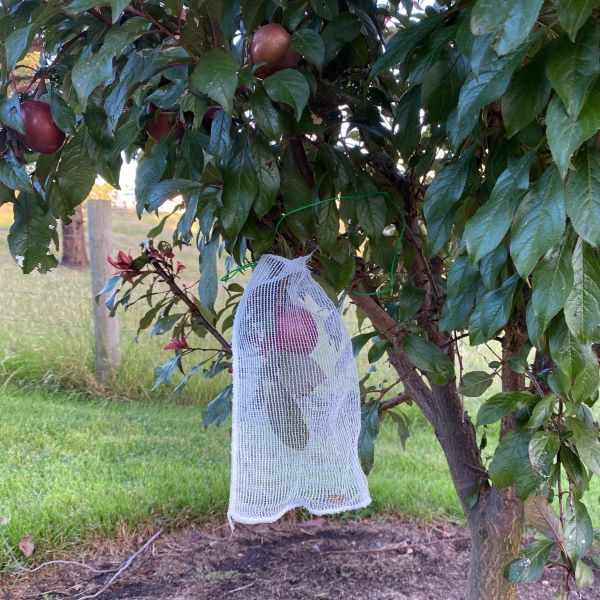The Queensland Fruit Fly (Bactrocera tryoni) is one of the most destructive pests for fruit growers in Australia. They are impacting fruit in Queensland and beyond and have reached some parts of Victoria.
These tiny but highly damaging pests lay their eggs inside ripening fruit, causing it to rot and become inedible. Protecting your fruit from Queensland fruit fly requires proactive measures, and one of the most effective solutions is fruit fly netting along with other solutions.
1. Use Fruit Fly Netting
Fruit fly netting is a physical barrier that prevents fruit flies from accessing your crops. This netting is specifically designed with a fine mesh size (commonly around 2-3mm) that blocks even the smallest pests while allowing sunlight, air, and water to reach your plants.
 By covering your fruit trees or crops with this netting, you create an impenetrable shield that ensures your harvest remains pest-free and healthy.
By covering your fruit trees or crops with this netting, you create an impenetrable shield that ensures your harvest remains pest-free and healthy.
Benefits of Using Fruit Fly Netting:
- Environmentally Friendly: Reduces the need for chemical sprays and pesticides.
- Cost-Effective: Reusable and durable netting saves you money in the long run.
- Versatile Protection: Protects not only from fruit flies but also from other pests, birds, and harsh weather.
Sage Horticultural has a variety of fruit fly netting that you can purchase in different sizes.
How to Use Fruit Fly Netting:
- Choose the Right Size: Select a netting size suitable for your fruit trees or garden beds. At Sage Horticultural, we offer netting by the roll or cut to length to suit your needs.
- Proper Installation: Drape the netting over your fruit trees, securing it tightly at the base to prevent fruit fly entry.
- Monitor and Maintain: Regularly check for any tears or gaps in the netting to ensure full protection.
2. Apply Fruit Fly Traps
Fruit fly traps are another effective way to manage these pests. These traps use an attractant, such as pheromones or food-based lures, to draw adult fruit flies. Once inside, the flies cannot escape.
- Types of Traps: You can use ready-made traps or create DIY traps with plastic bottles and bait.
- Placement: Position traps around the perimeter of your garden and near fruiting trees to target flies before they reach your crops.
Traps are a useful addition to other protective measures, helping to reduce fruit fly populations over time.
3. Use Organic or Chemical Sprays
In some cases, fruit fly populations may require additional treatment with organic or chemical sprays.
- Organic Sprays: Neem oil or spinosad-based products can be effective in managing fruit flies without harming beneficial insects.
- Chemical Sprays: Certain insecticides can be used, but they must be applied carefully and according to guidelines to avoid harming pollinators.
Always choose sprays that are safe for edible crops and consider their impact on the environment.
5. Bag Individual Fruit
For smaller-scale gardens, bagging individual fruits is a highly effective method of protection. Special fruit bags, made from fine mesh or paper, can be tied around individual fruits to shield them from fruit flies.
 This method is labour-intensive but provides targeted protection for prized fruits.
This method is labour-intensive but provides targeted protection for prized fruits.
4. Keep Your Garden Clean
Maintaining a clean garden is essential for preventing fruit fly infestations.
- Remove fallen or rotting fruits immediately, as they can attract fruit flies and become breeding grounds.
- Dispose of waste properly by sealing it in bags before discarding it or composting it in a fruit fly-proof bin.
Shop at Sage Horticultural
Sage Horticultural provides premium fruit fly netting designed to withstand the Australian climate. Our netting is easy to use, long-lasting, and available in various sizes to fit all types of gardens. Whether you’re a commercial grower or a backyard gardener, our fruit fly netting is the ultimate solution for keeping your fruits safe from Queensland fruit fly infestations.
Protect your precious harvest today – shop fruit fly netting at Sage Horticultural and enjoy a bountiful, pest-free garden!
FAQs
What time of day are fruit flies most active?
Fruit flies are most active during the early morning and late afternoon when temperatures are moderate. These periods are ideal for their feeding and reproduction activities, as extreme heat or cold slows them down. By observing these activity patterns, you can better plan preventive measures like setting up traps or using fruit fly netting during these peak times.
What is the fastest way to get rid of fruit flies?
The quickest way to get rid of fruit flies is to remove their breeding grounds, such as overripe fruits and food scraps, and thoroughly clean affected areas. Setting up apple cider vinegar traps with dish soap can effectively capture and kill adult fruit flies. Pairing these efforts with fruit fly netting in gardens prevents new infestations by physically blocking their access to crops.
What month are fruit flies most common in Australia?
Fruit flies are most common in Australia from November to April, during the warmer months. This period coincides with the growing and harvesting season for many fruits, creating ideal conditions for their reproduction. Using fruit fly netting during this time is crucial to protect crops from damage caused by these pests.
What smell do fruit flies hate the most?
Fruit flies dislike strong smells such as peppermint, eucalyptus, lavender, and basil. These scents can be used as natural repellents to deter fruit flies from gathering in specific areas. Additionally, cleaning surfaces with white vinegar can help eliminate odours that attract them while also repelling these pests.
How long do you leave fruit fly traps out?
Fruit fly traps should be left out for at least a week or until you see a noticeable reduction in their population. Refresh the bait regularly to maintain its effectiveness. Combining traps with fruit fly netting ensures a long-term solution by blocking new flies from accessing your crops.
Why do I suddenly have so many fruit flies?
A sudden fruit fly infestation is often caused by overlooked sources of attraction, such as ripe fruits, food scraps, or damp organic matter. Warm weather accelerates their breeding, leading to rapid population growth. Regular cleaning and using fruit fly netting in gardens can help prevent such infestations.
What is a good repellent for fruit flies?
Essential oils like peppermint, lavender, and eucalyptus are effective natural repellents for fruit flies. White vinegar spray can also repel them while cleaning surfaces of attractants. For a more comprehensive solution, fruit fly netting creates a physical barrier that prevents flies from reaching your plants and fruits.
What is the natural enemy of fruit flies?
Fruit flies are preyed upon by natural predators like parasitic wasps, spiders, and some bird species. These predators help control fruit fly populations outdoors. However, for reliable protection, especially in gardens, fruit fly netting remains the best option to block fruit flies from reaching your crops.
How do I get rid of fruit flies permanently?
To eliminate fruit flies permanently, remove all breeding grounds such as overripe fruits and food scraps, and clean all surfaces thoroughly. Use traps to catch adult fruit flies and implement fruit fly netting in gardens to prevent new infestations. Regular maintenance and monitoring will ensure they don’t return.